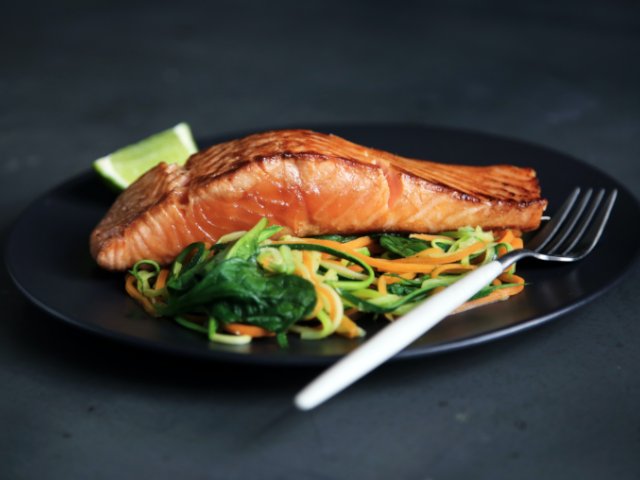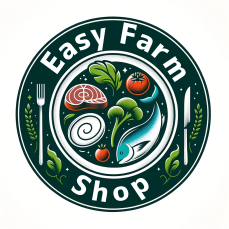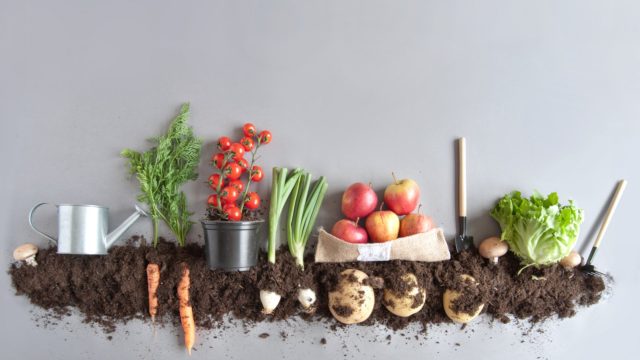Farm fresh fruit, meat, and veg are the best choices for losing weight, not only do they taste better and have more nutrients, but they’re also great for the environment and the local economy. An added bonus is that they’re less likely to be sprayed with insecticides or pumped full of antibiotics.
Local food is ALWAYS the best choice.
As soon as crops are harvested or animals are butchered they start to rot, so locally grown produce that gets to your table fast offers more nutrients than produce that travels over time and distance. Vitamins and antioxidants may be more than 100 percent higher in local crops versus industrially produced ones.
Storage times, temperatures, and exposure all affect nutrient loss. Factory farmed commercial food typically takes five days or more to get to the supermarkets.
The imported products sold in supermarkets can even be in transit for several weeks before they hit the shelves. Add a few days before they’re bought, plus several days in your fridge once you get them home and it’s easy to see why supermarket food is no match for nutrient-rich food available from your local farm shop.
Of course, many supermarkets choose to air freight short lifespan products from around the world. Unfortunately, air freight is the most polluting form of transport so that eliminates most of those products from the ethical consumer’s diet.
Here are the top 10 food groups you should choose for a healthy life.
1: Free Range Farm Eggs
Farm fresh eggs taste better and have more nutritional value than store bought eggs
Eggs are great value, extremely nutrient-dense, very tasty, and extremely versatile. Most of the nutrients like choline and vitamin D are in the yolks, the egg whites have few nutrients but are protein rich and contain something like 4–6 grams of protein per egg.
Because they’re high in protein and fat, eggs help you feel full (satiated) which is important in helping you reach or maintain a healthy weight.
A study of 50 overweight but otherwise healthy people showed that eating eggs and buttered toast for breakfast, instead of cereal, milk, and orange juice increased feelings of satiety (fullness) for the next 4 hours.
Once derided for being high in cholesterol, the current understanding of how the body regulates cholesterol levels has changed medical opinion.
While people with elevated baseline levels of LDL (bad) cholesterol should be more conscious of how much cholesterol they get in their diet, moderate egg consumption, between 7–12 eggs a week, has been proven safe for many people.
Farm Fresh Eggs are one of the best foods to eat if you want to reach or maintain a healthier weight.
2: Leafy greens
Leafy greens include kale, spinach, microgreens, arugula, turnip greens, cabbage, romaine lettuce, and Swiss chard. They have several properties that make them perfect for reaching or maintaining your healthy weight. They are packed full of fibre and nutrients that keep you satiated. They are also a great way to stay hydrated without having to drink gallons of mineral water.
Leafy greens also contain thylakoids, plant compounds that have been linked with increased satiety and better appetite management.
If you’re taking medications, such as blood thinners like warfarin (Coumadin), speak with a healthcare professional or a registered dietitian about how many leafy greens you should eat daily to find the right balance as they are high in vitamin K, which may interact with your medication.
3: Salmon
Fatty fish like salmon are incredibly nutritious and very satisfying.
Salmon is loaded with high quality protein, healthy fats, and various important nutrients.
It’s loaded with omega-3 fatty acids, which helps reduce inflammation. Inflammation plays a major role in obesity and metabolic disease.
Salmon and seafood in general also contain a significant amount of iodine which is essential for the proper thyroid function that you need to keep your metabolism running properly.
Studies show that many of us don’t get enough iodine in our diet so adding fatty fish like salmon, mackerel, trout, sardines, and herring to your diet can help immensely.

4: Cruciferous vegetables
Cruciferous vegetables include broccoli, cauliflower, cabbage, and brussels sprouts. Like other vegetables, they’re high in fibre and are incredibly filling.
What’s more, cruciferous veggies contain plenty of protein. Not as much as meat, poultry, fish, or legumes but a reasonable amount for a vegetable.
The combination of protein, fibre, and low energy density (low calorie content) makes cruciferous vegetables the perfect foods to include in your meals if you want to lose weight. They also contain compounds that may lower your risk of developing cancer.
5: Chicken breast and some lean meats
Meat is a controversial food for many, as apart from the issues of sustainability and ethics high consumption of red and processed meats is associated with a higher risk of cancer, diabetes, premature death, and heart disease.
Eating unprocessed meat in moderation (i.e., 2–3 servings a week) alongside fruits, vegetables, and whole grains may mitigate some of the health risks associated with meat consumption
Skinless chicken breast and lean red meat pack protein and iron and have less saturated fat than other cuts. Opt for these most of the time to better support weight management and heart health.
Saturated fat has been thought to drive inflammation, which is associated with chronic illness.
6: Potatoes and other root vegetables
White potatoes have fallen out of favour due to the rise of low carb diets, but potatoes and other root vegetables have many valuable properties that make them ideal foods for weight loss and good health.
They contain an incredibly diverse range of nutrients, a little bit of almost everything your body needs.
They’re particularly high in potassium, a nutrient that most people don’t get enough of and which plays an important role in blood pressure control
On a scale called the Satiety Index, which measures how filling different foods are, boiled white potatoes scored the highest of all foods tested.
If you allow potatoes to cool for a while after boiling, they’ll form a lot of resistant starch, a fibre-like substance that has been shown to have various health benefits, including weight loss and good gut health.
7: Beans and legumes
Climate Bonus: A UK study by Bangor University has shown that farmers who grow beans and legumes as part of their crop rotation can reduce the amount of polluting fertilizer by as much a half, something we should all encourage.
Beans and other legumes including fava beans, lentils, black beans, and kidney beans, can help with weight loss and general health.
Those foods are high in protein and fibre, which are two nutrients that promote satiety. They also contain some resistant starch, a type of starch that ‘resists’ digestion in the small intestine.
Whereas most starch we eat is quickly and completely digested in the upper gut, a little survives and passes through to the large bowel where it provides fuel for the resident bacteria (microbiome), which break it down (ferment) into products that help support a healthy digestive system and protect against gut and other diseases.
Due to their high fibre content, beans can cause gas and bloating in some people. Preparing them properly can help mitigate these side effects, though. Try buying your beans dry and soaking them for several hours before preparing.

8: Dairy
If you want to lose weight then avoiding dairy products is the conventional wisdom. On the other hand it’s fair say that eating dairy in moderation can be part of your healthy diet
Research shows that those who have deficiencies in calcium hold a greater fat mass and experience less control of their appetite. Studies have found that dairy sources of calcium – like yogurt, low or nonfat cheese, and milk – can be effective in accelerating weight loss
The use of moderate amounts of nonfat dairy products as part of a weight control diet seems reasonable. Because of their low calorie density and high protein content, nonfat dairy foods appear to provide more satiety per calorie than other foods, which means they’ll help you fill up on fewer calories.
And since people, especially women, tend to lose bone when they diet, it makes sense to include a moderate amount of calcium-rich foods in your weight-loss regimen.
One of the most protein-rich dairy products is cottage cheese, which is mostly protein.
Eating cottage cheese is a great way to boost your protein intake, which is important for building and maintaining muscle. It’s also very satiating and high in calcium.
Greek yogurt is especially great for weight management, as it has twice the amount of protein as regular yogurt.
Yogurt with live, active cultures also contain probiotic bacteria that can improve the function of your gut which may help protect against inflammation and protect against leptin resistance, which is one of the main hormonal drivers of obesity.
You could also, consider choosing full fat yogurt. Although the evidence is still mixed, some studies show that full fat dairy is associated with a reduced chance of developing obesity and type 2 diabetes over time.
9: Whole grains
Recent studies show that a diet rich in WHOLE grains can help support healthy weight loss. That’s because they’re loaded with fibre and contain a significant amount of protein. The best whole grains to eat include oats (porridge!!), brown rice, and quinoa.
Oats are loaded with beta-glucans, which are soluble fibres that increase satiety and improve metabolic health. Both brown and white rice contain significant amounts of resistant starch, and brown rice contains added nutrients and extra fibre.
Note that while REFINED grains (white bread and most commercial baked goods) are ok in moderation you should make resist them if possible and also remember that industrially produced foods with “whole grain” on the label are often ultra-processed, and they can contribute to unwanted weight gain when eaten in excess.
10: Fruit
Almost everyone agrees that fruit is healthy. Numerous population studies have shown that people who eat the most fruit and vegetables tend to be healthier than people who don’t.
Fruit contains natural sugar but have a low energy density and are packed with micronutrients. Their fibre content helps prevent the sugar from being released too quickly into your bloodstream.
Most fruit has properties that make them great for helping you achieve or maintain a healthy weight. Best of all are apples which is handy because they are one of the UK biggest farm crop
Apples are low in calories and high in fibre, a large apple has 116 calories and 5.4 grams of fibre. The best apples are organic because industrially produced apples are likely to have pesticides in their skin and it’s almost impossible to wash it off.
Because low-calorie fruits like apples are more filling, you may eat less of other foods during the course of the day. Notably, an apple is almost three times as filling as a chocolate bar
Research shows that apples are best eaten whole — rather than juiced — to reduce hunger and control appetite
The bottom line
Fresh Farm food is delicious, nutritious, and supportive of your goals to reach or maintain a healthier weight. The best foods are whole foods like fish, lean meat, vegetables, fruit, nuts, seeds, and legumes.

